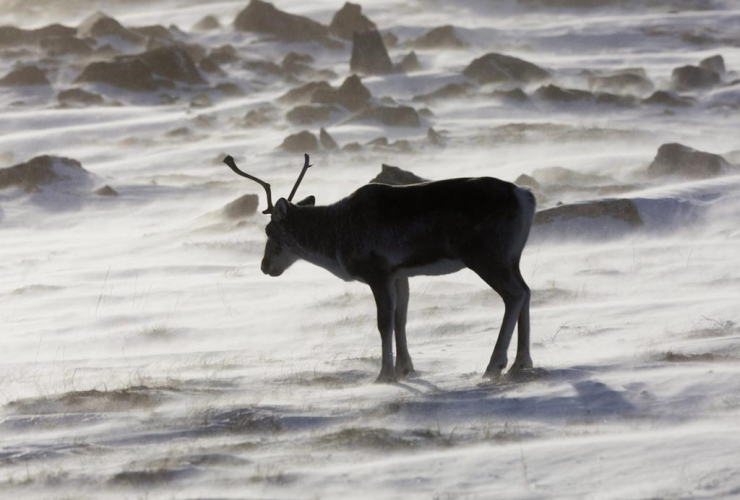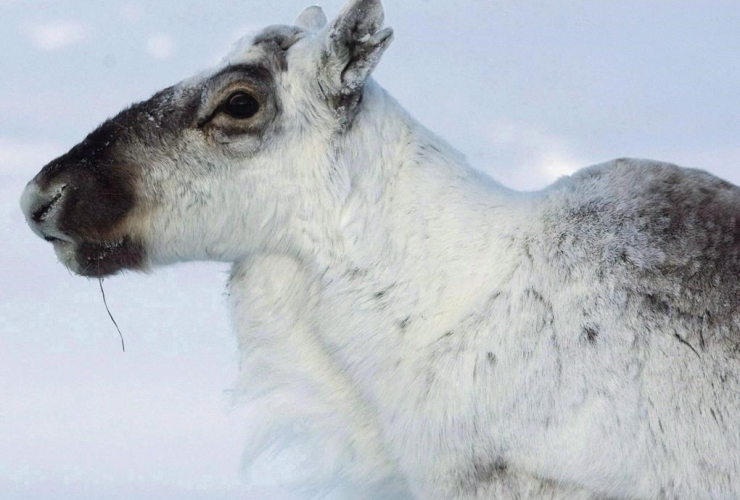An extensive study of caribou herds across British Columbia and Alberta suggests a way to reverse a long and steady decline of the endangered species — kill more wolves and moose and pen pregnant cows.
"It's go hard or go home," said Rob Serrouya, a University of Alberta biologist and lead author of the study released Monday in the Proceedings of the National Academy of Sciences.
"Unfortunately, it's that black or white."
Another study released within days of Serrouya's suggests another way. And wildlife advocates worry Serrouya's findings could be misused, illustrating the complexity of what he calls the "toughest conservation challenge in North America."
Serrouya and his colleagues looked at 18 caribou herds ranging over more than 90,000 square kilometres. At the study's start in 2004, 16 herds were declining.
Restoring habitat damaged by oil, gas and forestry activity is too slow, said Serrouya. Herds don't have the decades that takes.
The scientists compared four government-run management programs — killing wolves, protecting pregnant cows, moving caribou between ranges and culling moose that attract predators. Six of the herds were not managed.
By 2018, the unmanaged herds remained unchanged.
But eight of the 12 managed herds improved. Half of them had either stabilized or begun increasing. One almost doubled over three years to 67 from 36 animals.
"That's almost unprecedented," Serrouya said.
"It doesn't mean recovery, but it means some of these herds have turned around. It's the first study to show management has turned around sharp declines of caribou on such a broad scale."
Herds with the best growth rates were linked to both maternity pens to protect pregnant cows during calving and extensive wolf kills. Ranges with the best herd growth had the most intense cull.
Those five ranges saw a total of 144 wolves killed every year, mostly by aerial gunning and strychnine. A cull that large over the entire study area would result annually in nearly 650 carcasses, although Serrouya said that's not being recommended.
Removing moose at the same time would allow managers to kill up to 80 per cent fewer wolves, he said. Still, moose numbers in any one range would have to be reduced by up to 83 per cent.
Jonah Keim, an independent biologist and consultant, offers a different solution. In research published in the British Ecological Society's journal, he suggests caribou can be adequately protected by making it tough for wolves to get to them.
"What we need to do is reduce the encounters between wolves and caribou," he said. "You can do that without reducing the number of wolves."
Between 2011 and 2014, Keim studied what would happen if it weren't so easy for wolves, deer and moose to follow cutlines and forestry roads into caribou habitat. Over an 800-square-kilometre area, researchers dropped 200 cubic metres of tree debris every 200 metres.
The rate at which wolves stopped using the paths dropped 70 per cent, the study found.
"It was unbelievably effective at reducing wolf use," said Keim.
Serrouya applauded Keim's paper, but questioned its practicality on a landscape with 350,000 kilometres of linear disturbance.
"To block 350,000 kilometres would take years and years," he said. "What would happen in the meantime?"
Four herds vanished between 2004 and 2018.
Keim said efforts could be focused on where they'd do the most good. He suggested that snowmobile trails could be designed to draw wolf packs away from caribou. It wouldn't be that hard, he said.
"That type of work can be done in the summer or winter by somebody on foot."
Carolyn Campbell of the Alberta Wilderness Association fears Serrouya's findings could be used to declare "a war on wildlife."
"These findings could be used by industry and government to prolong unsustainable forest exploitation while endlessly harming wildlife species," she said.
She urged governments to keep restoring habitat.
Serrouya said drastic measures will be needed into the foreseeable future.
"Society would have to change the way it values natural resources. Society would have to decide to reduce the rate of resource extraction."
Killing wolves is never a
Killing wolves is never a good solution to a perceived problem. How people these days continue to arrive at these conclusions is disturbing. These practices are inhumane and murderous. It is not like saving the Trumpet swans, a recently documented success story. A general rule is that no wild species should be killed to save another wild species, Who are we to be making these decisions. I urge you to look at history of the disastrous result of the culling of the elephant in Africa. People listened to one British scientist ( a notable expert) whose bad advice resulted in a bloodbath of elephants, not by natural wildlife or poachers, but by a planned killing of elephants by the word of "scientists." Thousands of elephants were systematically killed. Write about that Bob Weber. Write about that. The scientist practically broke down on stage when, years later, he confessed to the audience about his error in judgement. We need to learn from experiences, and not think "it's a brand new day."
So if I read this correctly,
So if I read this correctly, the cause of the caribou decline is forestry, mining and oil production. The wolves suffer because of our interference. These majestic creatures deserve life as much as the caribou! Stop the cull!
If the problem is habitat
If the problem is habitat destruction, I don't see how any quick fixes are going to ultimately make caribou viable if we keep destroying more and more habitat. You can kill wolves, but how exactly will this give caribou anywhere to live? Any short term gain in numbers would presumably lead to a crash fairly soon as those greater numbers ran out of places to be and things to eat all the faster.
And of course it's the usual thing--it's our fault, so somebody else (the wolves) has to suffer for it. If it's our fault the caribou are going down and we want the wolves to stop eating caribou, then in fairness we should simply feed them something else. Cows, for instance.
Purple Library Guy usually
Purple Library Guy usually has some very sane things to say in provacative ways. Bureaucrats and government paid scientists are always going to frame study conclusions and recommendations in terms that fit the bureaucratic and prevailing political mind. Caribou range lies on top of prime extraction industry land and provinces where caribou roam also rely unhealthily on the revenues from extraction industries. Ergo - caribou must be sacrificed along with their primary predator. Restoration of damaged Caribou lands would go much faster if the extraction industry were forced to start remediation efforts the same day the first bulldozers/drilling rigs/tree harvesters appear. - not waiting until the moonscape devastation is revealed when they declare bankruptcy and slink off into the criminal financial underworld. Additionally , provinces in charge of permitting extraction projects and the infrastructure required to make the products available to the markets (pipelines, anyone?) should be requiring bonds, insurance, increased royalties - whatever works to ensure that remediation actually takes place. If humanity (and other earth life forms) cannot live with the pace nature dictates then it is our responsibility to create repairs at the same pace we create destruction!






Comments